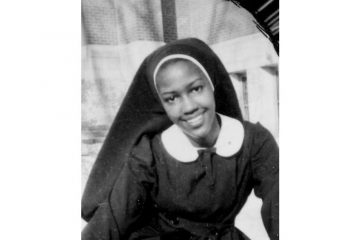Catholic Moment: What Keeps Me Catholic? What keeps me Catholic? My daughters
August 10, 2011
By Michael Daley
I had just stopped the mower to talk with my neighbor, Dan, when his son excitedly called from a few houses down, “Dad, they tied it.”
At this point, Dan cut his conversation with me and walk with his dog short. Given the heat of the day, I didn’t resist when he invited me back to see the end of the game.
Entering the house, I saw what looked to be the unimaginable: three teenage boys seated on a couch watching the semifinal World Cup game between Brazil and the United States. Did I mention this was women’s soccer?
The game ended in a tie. All of us were nervous with anticipation as the penalty kicks began. I cautiously warned our group that I hoped the American women didn’t win because if they did, we’d all have to do a group hug. Just picture it — five men celebrating an athletic triumph…of women.
America did win. In the end, we settled for high-fives. Interestingly, as I watched the game being played, I was struck by the maturity of the viewers. There were no remarks about the supposed athletic inferiority of women. No one commented on how “hot” this or that player was. In fact, there were no snide or sexist asides. Did I mention five guys were watching the game?
As the father of two daughters, I can honestly say that we’ve come a long way.
Athletically, economically, educationally, politically, and spiritually women have made significant and long-deserved advances over the years. Both women and, especially, men are the better for it.
Recognizing this, Pope John Paul II, begins his 1995 “Letter to Women” with a word of “thanks” to them. He is quick to point out, however, that saying “thanks” is not the end, but a beginning.
Pope John Paul writes, “Unfortunately, we are heirs to a history which has conditioned us to a remarkable extent. In every time and place, this conditioning has been an obstacle to the progress of women. Women’s dignity has often been unacknowledged and their prerogatives misrepresented; they have often been relegated to the margins of society and even reduced to servitude. This has prevented women from truly being themselves, and it has resulted in a spiritual impoverishment of humanity.”
Reading this passage, I was reminded of our family’s trip this summer to Savannah, Ga. There we visited the home of Juliette Gordon Low, the founder of the Girl Scouts. Countering the cultural expectations — or “conditioning” — of her day, Juliette Low encouraged girls to go outdoors and, in the process, develop self-confidence. In addition to traditional homemaking skills, she gave the girls opportunities in the arts, sciences and business.
Juliette Low’s message is indeed “good news.” As Pope John Paul II goes on to say: “When it comes to setting women free from every kind of exploitation and domination, the Gospel contains an ever relevant message which goes back to the attitude of Jesus Christ himself. Transcending the established norms of His own culture, Jesus treated women with openness, respect, acceptance and tenderness.”
Whether in the church or society, sexual difference need not lead to (as it has in the past) discrimination. Sadly, St. Paul’s vision of the body of Christ — “neither Jew nor Greek, slave nor free, male nor female” — has yet to be fully realized.
This is what keeps me Catholic, however. I want to work for and with my daughters to create a Catholic community that honors women’s experience, whether it is painful or uplifting, frustrating or inspiring, alienating or attractive — one which seeks to reconcile their faith and femaleness in accord with the fullness of their baptismal dignity.
Daley is a freelance writer and religion teacher at St. Xavier High School.













